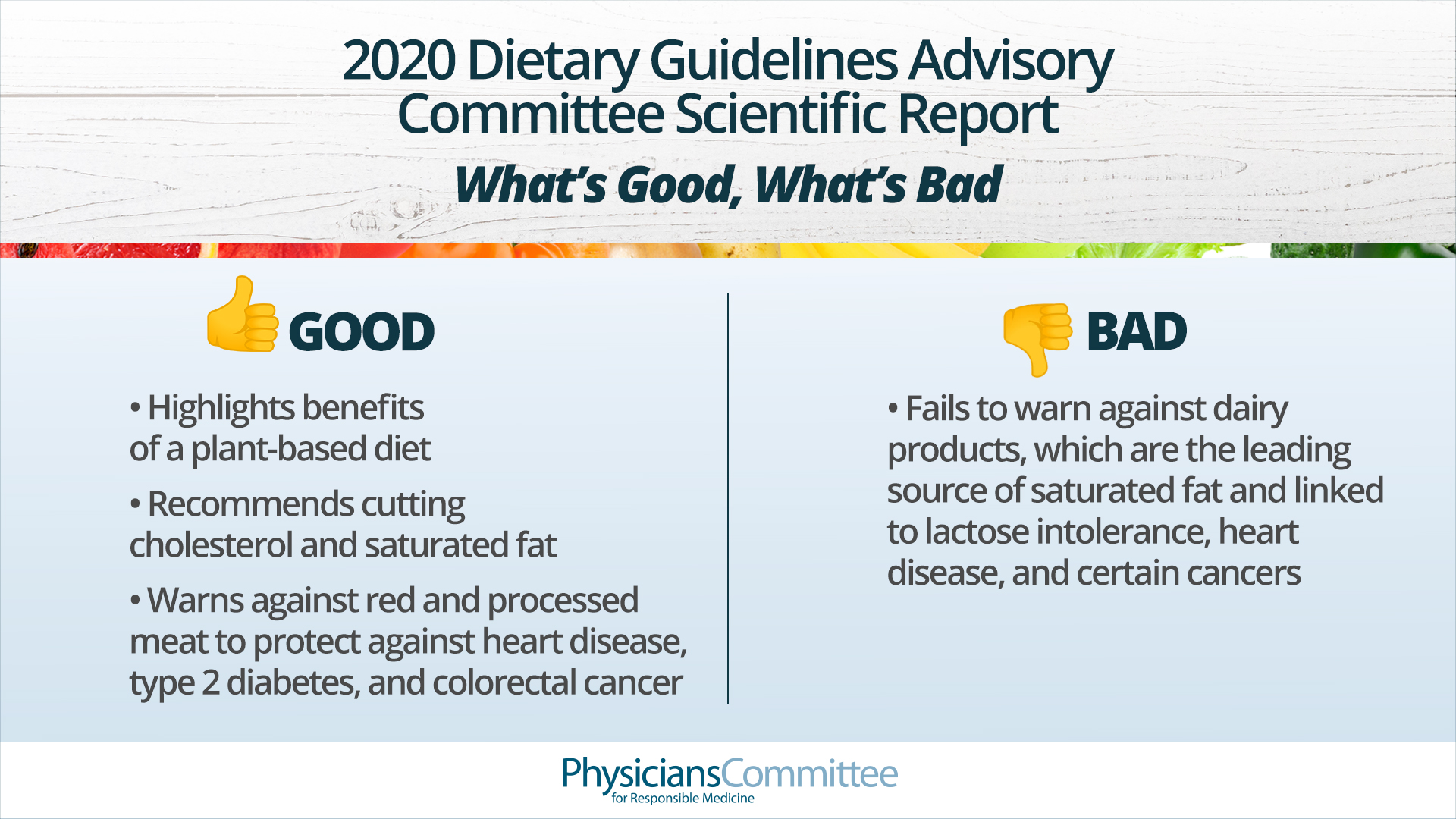Dietary Guidelines Report Right on Eating Plant-Based Diet, Avoiding Saturated Fat, Meat, Cholesterol

WASHINGTON—The Physicians Committee for Responsible Medicine applauds the Dietary Guidelines Advisory Committee (DGAC) for recommending in its scientific report released today that Americans should avoid saturated fat, cholesterol, and red and processed meat and instead focus on carbohydrate-rich plant-based foods for optimal health. But the doctors group faults the DGAC for failing to warn against dairy products, which are the leading source of saturated fat in the American diet and increase the risk of heart disease and other health conditions.
The DGAC recommends dietary patterns that “provide the majority of energy from plant-based foods, such as vegetables, fruits, legumes, whole grains, nuts and seeds; provide protein and fats from nutrient-rich food sources; and limit intakes of added sugars, solid fats, and sodium.”
“The Dietary Guidelines Advisory Committee finally got it right by finding that plant-based foods are beneficial for every health condition and that red and processed meat are beneficial for none,” says Susan Levin, MS, RD, CSSD, director of nutrition education for the Physicians Committee for Responsible Medicine. “But they missed the mark when they failed to warn against dairy products, which are the leading source of saturated fat in the American diet.”
The report looked at how foods affect various conditions—including heart health, overweight and obesity, diabetes, cancer, and all-cause mortality—and found that “the types of foods that individuals should eat are remarkably consistent.”
The report notes that “reduced risk of all-cause mortality was observed in several studies that examined dietary patterns without animal-products, such as those described as vegetarian, vegan, or determined by ‘plant-based’ diet indices.”
When it comes to diabetes, the report highlights Physicians Committee research showing that plant-based diets high in carbohydrates reduce body weight and body fat and improve insulin function in overweight individuals.
The U.S. Department of Agriculture and Department of Health and Human Services will use the DGAC’s report to develop the 2020-2025 Dietary Guidelines for Americans.
The key takeaways from the DGAC scientific report are:
GOOD
Cholesterol: The DGAC says it’s “prudent to recommend lower intake of foods high in dietary cholesterol.” Research shows that dietary cholesterol raises blood cholesterol levels, raising the risk of heart disease and death.
Plant-Based Diets: The DGAC recognizes that fruits, vegetables, and grains are the most beneficial components of a healthful dietary pattern for reducing the risk of several chronic diseases, including heart disease, type 2 diabetes, and bone health. The report says, “A noteworthy difference from the 2015 Committee report is that whole grains are now identified with almost the same consistency as vegetables and fruits as beneficial for the outcomes examined, suggesting that these 3 plant-based food groups are fundamental constituents of a healthy dietary pattern.”
Red and Processed Meat: The DGAC warns against red and processed meat because they are associated with conditions including heart disease, type 2 diabetes, and colorectal cancer. Red and processed meat are not associated with any health benefits.
Saturated Fat: The DGAC recommends replacing saturated fat, found mostly in animal products, with unsaturated fats, found mostly in plant-based foods, and carbohydrates to lower cardiovascular disease risk. The DGAC says common food sources of saturated fat are mixed dishes containing cheese and/or meat, pizza, and full fat dairy products (cheese, cream and ice cream, and whole milk).
BAD
Dairy Products: The DGAC says, "Two to 3 cup eq of total Dairy foods are recommended for consumption each day; the recommendation is 3 cups for most age-sex groups, regardless of activity level.” The DGAC also says high-fat dairy is associated with type 2 diabetes, but the report fails to address many other health conditions linked to dairy products. Scientific evidence shows that milk and other dairy products increase the risk of asthma, breast, ovarian, and prostate cancers, cognitive decline, and early death, and offer little if any protection for bone health.
In 2018, the American Medical Association passed a resolution recognizing that lactose intolerance is common among many Americans, especially African Americans, Asian Americans, and Native Americans, and recommending that the Dietary Guidelines for Americans indicate that “meat and dairy products are optional.”
Media Contact
Michael Keevican
202-527-7367
mkeevican[at]pcrm.org
Founded in 1985, the Physicians Committee for Responsible Medicine is a nonprofit organization that promotes preventive medicine, conducts clinical research, and encourages higher standards for ethics and effectiveness in education and research.








